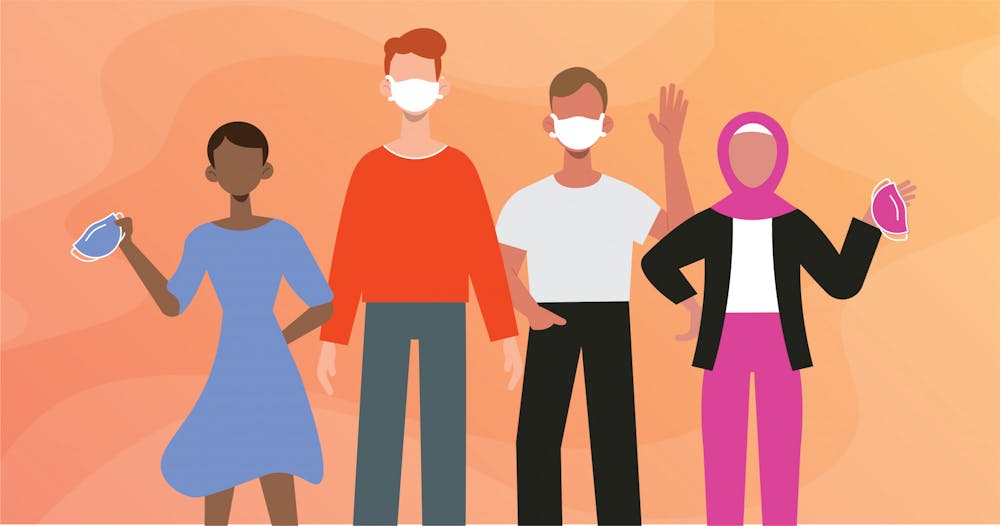Over a year after the initial COVID-19 shut down, UF faculty and students will be able to see each others’ unmasked faces again.
UF announced May 17 that face coverings are no longer required on UF property, as all operations prepare to transition to pre-pandemic norms.
The updated policies were announced through an university-wide email, which also announced that classroom, recreational and athletic activity will return to full capacity.
Normal activity on campus will resume June 28, the start of Summer B, according to UF’s COVID-19 page. The update followed a university announcement that three quarters of students have been vaccinated.
The university did not provide further comment about protocol regarding tailgates, quarantine dorms, dining hall operations and sanitation services.
UF spokesperson Cynthia Roldan, UF Health director of Screen, Test & Protect Dr. Michael Lauzardo and UF Health spokesperson Ken Garcia also did not respond to questions regarding the university’s plans to respond to potential spikes in cases, how to encourage mask use among unvaccinated students, or include vaccination data on the university’s COVID-19 dashboard.
UF’s chapter of United Faculty of Florida, a union representing UF’s faculty, also supported the university’s plans to return to pre-pandemic operations.
Returning to pre-pandemic operations can be a reasonable goal, as long as UF continues to address faculty and students’ concerns, Meera Sitharam, vice president of UFF-UF, wrote in an email.
She hopes the administration ensures students, faculty and staff are vaccinated, keeps an eye out for CDC guidelines — especially on new coronavirus variants — and is prepared to make the necessary changes at short notice if needed.
Meanwhile, Barstool Sports’ Florida affiliate account posted about the reopening, and received over 10,000 likes on Instagram.
While some students are excited to attend in-person classes, cheer loudly at sports events and roam campus with friends, others are concerned for their health and safety.
Graduate Assistants United, a union representing UF’s graduate employees, demonstrated great concern over this development. The organization represents over 4,000 graduate student employees who work for the university as teacher assistants and researchers.
Following complaints about lack of transparency and inclusion with the university’s plans, graduate students have been disappointed with UF’s administration for years.
“We’re just very disheartened and upset that UF has decided once again to make this decision without any consultation or discussion with faculty, staff, or students or graduates,” Rachel Hartnett, co-president of UF’s GAU chapter and co-chair of the joint UFF-GAU COVID council, said.
She said all COVID-related decisions have been made at an administrative level and applied top down, without consulting with UF’s labor union.
“When we have voiced complaints and issues, beginning way back to last October, we have been ignored by the university,” she said.
As someone with a chronic illness, Hartnett said she is worried about potentially being in close contact with students who are not vaccinated. UF encouraged face coverings for unvaccianted and chronically ill individuals following Centers for Disease Control and Prevention recommendations.
“I’d like to think that all the students when I teach in Fall have my best interests in mind and are vaccinated and want to protect their fellow teachers,” she said. “But am I willing to risk my life on it?”
She said UF GAU would support a vaccine mandate with medical and religious exemptions.
“It’s no different than some of these other vaccines that are required to come, and it would absolutely make sure that we keep our COVID numbers down and our infections down,” Hartnett said.
Without a vaccine requirement, teacher assistants are being asked to put their trust in not just students, but parents, friends and total strangers, she said.
“It seems as if UF is putting reopening and reaching that top five status over its employees, which is unfortunate,” she said.
She said these decisions hurt hiring and retention of graduate students and faculty.
Victor Paes-Leme, a 20-year-old aerospace engineering junior, said he learns better through in-person lectures and is hopeful for a positive transition back to on-campus activity.
He said he plans to still carry a mask in his backpack to be considerate of people who haven’t been vaccinated or would prefer to meet with masks on .
“I’m very excited to just be able to go to the library and be with people again,” Paes-Leme said.
Contact Alexandra Harris at aharris@alligator.org. Follow her on Twitter @harris_alex_m.

Alexandra is a senior journalism major reporting on Science/Environment for The Alligator. Her work has appeared in The Gainesville Sun, and she filed public records requests for the Why Don't We Know investigative podcast. She has a passion for the environment.






